Reclaimed Water
In a desert, water is an especially valuable resource. Periods of drought are common here. In order to conserve our water, many valley cities have turned to reclaimed water as a valuable source of water for situations when drinking water quality is not required.
What exactly is reclaimed water?
Reclaimed water, is wastewater collected from homes and businesses, which undergoes a highly advanced treatment process. This treatment process makes reclaimed water safe for reuse on landscape irrigation. Water reuse is a vital component to water conservation efforts in our growing communities.
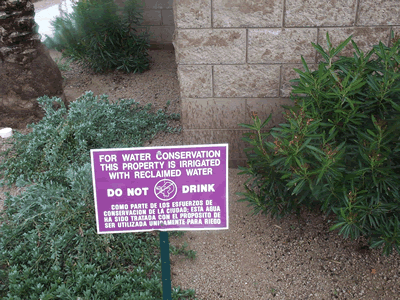
Photographer: Kathleen Moore
What are the benefits of using reclaimed water?
| • | Reduced use of drinking water |
| • | Readily available |
| • | Reliable |
| • | Increasing supply with population growth |
How is wastewater treated?
Water reclamation facilities use a state-of-the-art treatment process that cleans and disinfects the wastewater. Monitoring and testing is performed daily on the finished product to ensure the reclaimed water delivered is fully compliant with all state, county, and city safety requirements. As with drinking water, the quality of reclaimed water is regulated by the Arizona Department of Environmental Quality (ADEQ) and the Maricopa County Environmental Services Department.
Where is reclaimed water Used?
Approved uses for reclaimed water:
| • | Irrigation on golf courses, parks, common areas in homeowner communities, and roadside landscaping. |
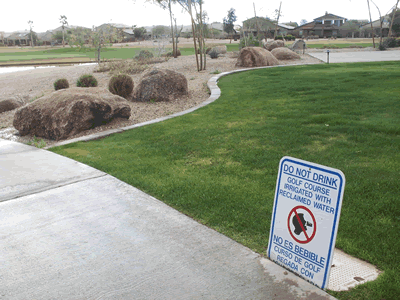
Photographer: Kathleen Moore
| • | Aesthetic purposes such as fountains and decorative lakes or ponds. |
| • | Agricultural uses for irrigation such as pasture lands and irrigation at nurseries. |
| • | Wetlands creation, restoration, and enhancement. |
| • | Industrial uses including plant wash down, processing water, and cooling water. |
| • | Groundwater recharge. |
How can I recognize Reclaimed Water?
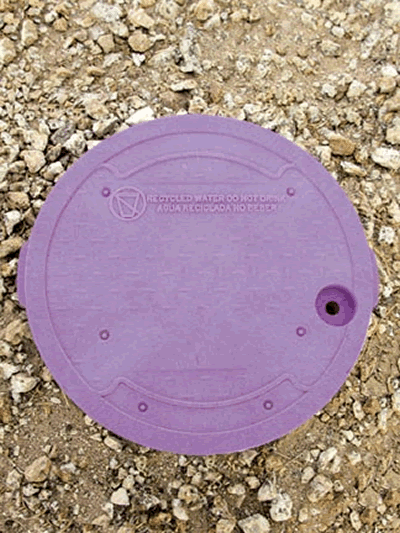
Photographer: Kathleen Moore
Purple signs, pipes, valve boxes, and sprinkler heads let you know that reclaimed water is being used.
Is it safe? What if humans or pets come in contact with reuse water or accidentally ingest it?
It is completely safe to enjoy the parks and common areas with your children or pets.
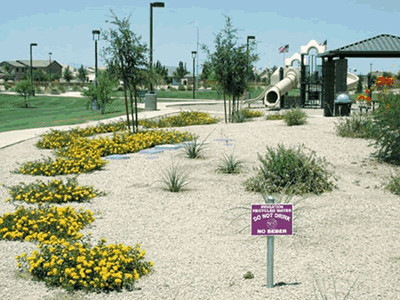
Photographer: Kathleen Moore
While you would not want to drink or swim in reclaimed water it is treated to a level acceptable for human contact. Accidental ingestion poses no significant concerns for humans or animals. According to state health and water quality officials, no health-related problems have been traced to any of the reclaimed water projects operating for the last 20 years in Arizona.
Aren’t all these lakes and grassy areas a waste of water?
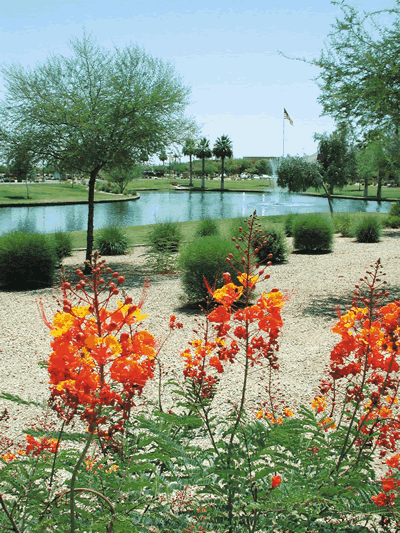
Photographer: Kathleen Moore
No, lakes and turf areas play important roles in water reuse. Lakes act as reservoirs, storing water until it is needed for irrigation. Reclaimed water that is used to irrigate grassy areas allows cities to have large open recreational areas with the added plus of using a recycled resource.
Is it true that reclaimed water saves drinking water?
Yes. Millions of gallons of reclaimed water are used each year in place of drinking water. Because less drinking (potable) water is used on landscapes and in industry, water reuse has eased the demand on our groundwater and surface water resources.
Which cities in Arizona use reclaimed water?
Chandler, Gilbert, Glendale, Mesa, Peoria, Phoenix, Scottsdale, Tempe, Peoria and Tucson are all currently using reclaimed water. Some use only a portion of their reclaimed water, others use 100 percent. More cities are recognizing the value in establishing reclaimed water systems as alternative water sources.
My neighbor tells me because our HOA uses reclaimed water, we can use as much as we want. Is this true?
Reclaimed water is a valuable water resource because it reduces demands on groundwater and surface water sources making it a significant water conservation tool. Water is a finite resource and none of it should be wasted. All the fresh water that will ever be created is already on the earth’s surface or stored underground in aquifers. Once water is applied to a landscape it is not recoverable like the wastewater that goes down your home’s drain. However, the wastewater from your home can be captured, treated, and used again. All users should treat reclaimed water with the same respect as potable water.
Reclaimed water is an environmentally sound way of reusing our water resources while at the same time saving our precious water supplies for future use.
Cathy Rymer Water Conservation Specialist Town of Gilbert |
Kathleen Moore Water Conservation Coordinator City of Chandler |